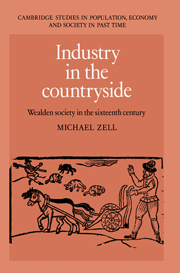Book contents
- Frontmatter
- Contents
- List of figures
- List of tables
- Acknowledgements
- List of abbreviation
- 1 Introduction
- 2 Landholding, inheritance and the local land market
- 3 Demographic movements, household structure and geographical mobility
- 4 The Wealden agrarian regime
- 5 Occupational structure and levels of wealth in the Weald
- 6 The textile industry in the Weald
- 7 Clothiers and capitalism
- 8 The Weald and ‘proto-industrialization’
- Bibliography
- Index
- Cambridge Studies in Population, Economy and Society in Past Time
1 - Introduction
Published online by Cambridge University Press: 13 October 2009
- Frontmatter
- Contents
- List of figures
- List of tables
- Acknowledgements
- List of abbreviation
- 1 Introduction
- 2 Landholding, inheritance and the local land market
- 3 Demographic movements, household structure and geographical mobility
- 4 The Wealden agrarian regime
- 5 Occupational structure and levels of wealth in the Weald
- 6 The textile industry in the Weald
- 7 Clothiers and capitalism
- 8 The Weald and ‘proto-industrialization’
- Bibliography
- Index
- Cambridge Studies in Population, Economy and Society in Past Time
Summary
Historians – as Lesley Clarkson recently reminded us – seem to be born with an irrepressible urge to generalize; they regularly set out to construct historical models, and to generate wide-ranging hypotheses about historical change. And surely this situation is beneficial to all concerned, so long as historians exercise their critical skills on new and old historical models with the same acuity as those who have created them. The theory of ‘proto-industrialization’ is a case in point. Not the least controversial of such models, it attempts to tackle at the most general level certain central questions which will be raised in this study (as well as much else about modern economic development in the West): how did some rural regions or sub-regions become sites of intensive manufacturing during the 200 or 300 years before the English ‘Industrial Revolution’, and how exactly did these ‘industries in the countryside’ fit into their surrounding geographical, agrarian and social contexts?
The ‘proto-industrialization’ hypothesis, as enunciated by Franklin Mendels in 1972, was, however, more than a model of pre-Industrial Revolution manufacturing. It also amounted to a grand, two-stage, theory of Western economic development, in which the evolution of economic institutions and the concentration of capital which occurred in the seventeenth and early eighteenth centuries are as important as the ‘industrial revolution’ of the next century. The rural, ‘domestic’ industries of the early modern era were seen by Mendels and his supporters as containing the conditions for the ensuing development of factory-based manufacturing: ‘proto-industrialization’ leads to ‘industrialization’.
- Type
- Chapter
- Information
- Industry in the CountrysideWealden Society in the Sixteenth Century, pp. 1 - 9Publisher: Cambridge University PressPrint publication year: 1994

